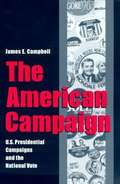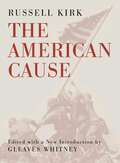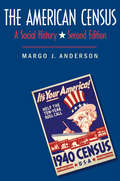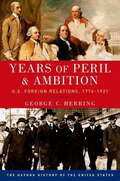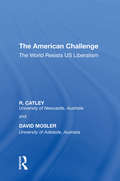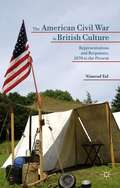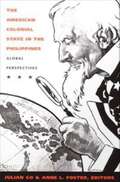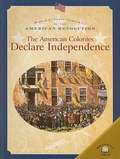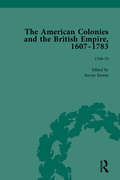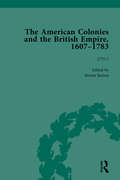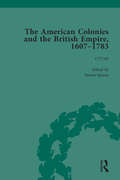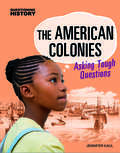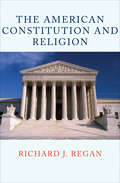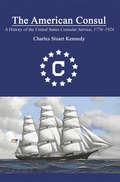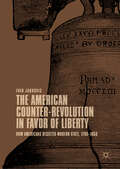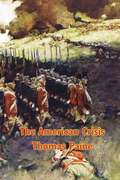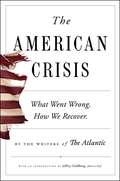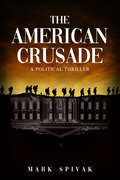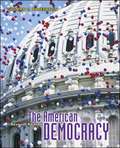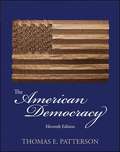- Table View
- List View
The American Campaign: U.S. Presidential Campaigns and the National Vote
by James E. CampbellThe 1994 Mid-Term elections, the "Republican Revolution" that returned control of both Houses of Congress to the Republicans for the first time in over 40 years, returned us to the state of "divided government" that has been the political norm since the 1950s. In this timely new revision of his instant classic, Morris Fiorina outlines the causes and consequences of "ticket-splitting" and divided government.
The American Cause
by Russell KirkThe American Cause explains in simple yet eloquent language the bedrock principles upon which America's experiment in constitutional self-government is built. Russell Kirk, whose life and thought has recently been featured in C-SPAN's acclaimed American Writers series -- intended this little book to be an assertion of the moral and social principles upholding our nation. Kirk's primer is an aid to reflection on those principles -- political, economic, and religious -- that have united Americans when faced with challenges and threats from the enemies of ordered freedom. In this new age of terrorism, Kirk's lucid and straightforward presentation of the articles of American belief is both necessary and welcome. Gleaves Whitney's newly edited version of Kirk's work, combined with his insightful commentary, make The American Cause a timely addition to the literature of liberty.
The American Census
by Margo AndersonThis book, published on the eve of the bicentennial of the American census, is the first social history of this remarkably important institution, from its origins in 1790 to the present. Margo Anderson argues that the census has always been an influential policymaking tool, used not only to determine the number of representatives apportioned to each state but also to allocate tax dollars to states, and, in the past, to define groups-such as slaves and immigrants-who were to be excluded from the American polity.
The American Century and Beyond: U.S. Foreign Relations, 1893-2014 (The Oxford History of the United States)
by George C. HerringAt the turn of the twentieth century, the United States seemed poised to achieve a position of world power beyond what the Founding Fathers could have ever imagined. In The American Century and Beyond, the second part of a new split- volume paperback edition of the magisterial From Colony to Superpower, George C. Herring recounts the rise of the United States as a major power after the First World War and well into the new millennium. Examining the nation's decisive involvement in global events, this volume tracks its progress to becoming the world's lone superpower— a unipolar moment that turned out to be strikingly brief. The American Century and Beyond provides readers with the full scope and impact of American foreign policy in the 20th and 21st centuries.
The American Challenge: The World Resists US Liberalism
by R. CatleyThe rise of the US as a hegemonic power during the twentieth century first pursuing a liberal project of globalization under Clinton and then moving towards greater unilateralism after the election of George W. Bush, is comprehensively described in this much-needed study. Following the invasion of Iraq, the Bush administration became increasingly unpopular at home and abroad. America's power to impose its will declined and rivals were able to take advantage of its weakened state and pursue their own agendas with considerable success. This indispensable book looks at whether policy failure in Iraq and declining US soft and hard power mark the beginning of the end of US hegemony or whether the resilience of America's military and economic foundations will once again prove observers wrong.
The American Civil War in British Culture
by Nimrod TalImprinted onto the political discourse, military thought, intellectual life and popular culture, no other foreign conflict left such a deep, lasting mark on British culture as did the American Civil War. Britain's leading politicians, strategists, and thinkers have kept turning to the American conflict from the 1870s to the present, as has the British public more broadly. Drawing on political records, military writings, academic studies, films and interviews, as well as on a wide array of previously unpublished material, this book traces the sources of Britons' appeal to the American conflict and their use of its representations. While people from the United Kingdom often found the American Civil War useful to buttress their views on domestic affairs, the records show that the British used the war and its memory also to advance their interests in the United States, thus making the phenomena examined in this book both local and transatlantic.
The American Colonial State in the Philippines: Global Perspectives
by Julian Go Anne L. FosterIn 1898 the United States declared sovereignty over the Philippines, an archipelago of seven thousand islands inhabited by seven million people of various ethnicities. While it became a colonial power at the zenith of global imperialism, the United States nevertheless conceived of its rule as exceptional--an exercise in benevolence rather than in tyranny and exploitation. In this volume, Julian Go and Anne L. Foster untangle this peculiar self-fashioning and insist on the importance of studying U. S. colonial rule in the context of other imperialist ventures. A necessary expansion of critical focus, The American Colonial State in the Philippines is the first systematic attempt to examine the creation and administration of the American colonial state from comparative, global perspectives. Written by social scientists and historians, these essays investigate various aspects of American colonial government through comparison with and contextualization within colonial regimes elsewhere in the world--from British Malaysia and Dutch Indonesia to Japanese Taiwan and America's other major overseas colony, Puerto Rico. Contributors explore the program of political education in the Philippines; constructions of nationalism, race, and religion; the regulation of opium; connections to politics on the U. S. mainland; and anticolonial resistance. Tracking the complex connections, circuits, and contests across, within, and between empires that shaped America's colonial regime, The American Colonial State in the Philippines sheds new light on the complexities of American imperialism and turn-of-the-century colonialism. Contributors. Patricio N. Abinales, Donna J. Amoroso, Paul Barclay, Vince Boudreau, Anne L. Foster, Julian Go, Paul A. Kramer
The American Colonies Declare Independence (World Almanac Library Of The American Revolution)
by Dale AndersonThis comprehensive, eight-volume series tells the story of the founding of the United States and helps students understand that the American Revolution was more than just a series of battles—it was a revolution of ideas. <P><P>Each title explains the important political, military, and social aspects of the Patriots' struggle for independence. Using quotations from primary sources and biographical focus boxes, this series presents the story of the American Revolution in clear, engaging text and gives students a deeper understanding of why the war was fought and how it was won. An ideal resource on a key curriculum topic.
The American Colonies and the British Empire, 1607-1783, Part II vol 6
by Jack P. GreeneThis second part of an eight-volume reset edition, traces the evolution of imperial and colonial ideologies during the British colonization of America. It covers the period from 1764 to the end of the American Revolutionary War in 1783.
The American Colonies and the British Empire, 1607-1783, Part II vol 7
by Steven Sarson and Jack P. GreeneThis second part of an eight-volume reset edition, traces the evolution of imperial and colonial ideologies during the British colonization of America. It covers the period from 1764 to the end of the American Revolutionary War in 1783.
The American Colonies and the British Empire, 1607-1783, Part II vol 8
by Steven SarsonThis second part of an eight-volume reset edition, traces the evolution of imperial and colonial ideologies during the British colonization of America. It covers the period from 1764 to the end of the American Revolutionary War in 1783.
The American Colonies: Asking Tough Questions (Questioning History)
by Jennifer KaulWhy did the Pilgrims and other settlers come to North America? How did American Indians react to white settlers on their land? How was North America changed by the colonists? The colonization of the New World led to major changes for both European colonists and the native peoples who already lived there. Using an inquiry-based approach, primary sources, and quick-reference infographics, readers will learn all about the historic changes that took place in the land and various people's lives at the beginning of Colonial America.
The American Congress
by Steven S. Smith Ryan J. Vander Wielen Jason M. RobertsThe American Congress provides the most current treatment of congressional politics available in an undergraduate text. Informed by the authors' Capitol Hill experience and scholarship, this book presents a crisp introduction to major features of Congress: parties and committee systems, leadership, voting and floor activity. This text contains discussions of the importance of presidents, courts and interest groups in congressional policy making. Recent developments are also discussed within the context of congressional political history. The seventh edition includes complete coverage of the first Congress of the Obama presidency, the 2010 midterm elections, healthcare reform and an early perspective on the 112th Congress with a Republican majority.
The American Congress
by Steven S. Smith Ryan J. Vander Wielen Jason M. Roberts Steven S. Smith Jason M. RobertsThe American Congress provides the most insightful, up-to-date treatment of congressional politics available in an undergraduate text. Informed by the authors' Capitol Hill experience and nationally-recognized scholarship, The American Congress presents a crisp introduction to all major features of Congress: its party and committee systems, leadership, and voting and floor activity. The American Congress has the most in-depth discussions of the place of the president, the courts, and interest groups in congressional policy made available in a text. The text blends an emphasis on recent developments in congressional politics with a clear discussion of the rules of the game, the history of key features of Congress, and stories from recent Congresses that bring politics to life. No other text weaves into the discussion of the important ideas of recent political science research. The book includes the most comprehensive list of suggested readings and Internet resources on Congress.
The American Congress
by Steven S. Smith Jason M. Roberts Smith, Steven S. and Roberts, Jason M. and Vander Wielen, Ryan J. Vander Wielen, Ryan J.Completely up-to-date and with new learning features, the 8th edition of this respected textbook provides a fresh perspective and a crisp introduction to congressional politics. Informed by the authors' Capitol Hill experience and scholarship it features insights from the two Congresses of Obama's presidency, the 2012 elections, health care reform, and an early take on the 113th Congress. The text engages students by emphasizing the importance of a strong legislature in American democracy and has new end-of-chapter discussion questions and further reading. Alongside clear explanations of congressional rules and the law-making process there is a greater wealth of examples from contemporary events and debates, to highlight Congress as a group of politicians as well as a law-making body. These recent developments are presented within the context of congressional political history. This edition is also more visual – timelines and flow-charts have been added and the number of photos has doubled.
The American Congress Reader
by Steven S. Smith Ryan J. Vander Wielen Jason M. Roberts Steven S. Smith Jason M. RobertsThe American Congress Reader provides a supplement to the popular and newly updated American Congress undergraduate textbook. By the same authors who drew upon Capitol Hill experience and nationally recognized scholarship to present a crisp introduction and analysis of Congress's inner mechanics, the Reader compiles the best relevant scholarship on party and committee systems, leadership, voting, and floor activity to broaden and illuminate the key features of the text.
The American Constitution and Religion
by Richard J. ReganA &“highly informative and enjoyable&” study of Supreme Court cases involving the place of religion in society (Nicholas P. Cafardi, America Magazine). The Supreme Court&’s decisions concerning the first amendment are hotly debated, and the controversy shows no signs of abating. Adding much-needed historical and philosophical background to the discussion, Richard J. Regan reconsiders some of the most important Supreme Court cases regarding the establishment clause and the free exercise of religion. Governmental aid to church-affiliated elementary schools and colleges; state-sponsored prayer and Bible reading; curriculum that includes creationism; tax exemption of church property; publicly sponsored Christmas displays—these and other notable cases are discussed in Regan&’s chapters on the religious establishment clause. On the topic of the free-exercise clause, Regan considers such subjects as the value of religious freedom, as well as the place of religious beliefs in public schooling and government affairs. Important cases concerning conscientious objection to war, regulation of religious organizations and personnel, and western traditions of conscience are also examined. This book, written for students of law, political science, and religion, presents the relevant case law in chronological order. The addition of the historical context and Regan&’s philosophical discussion enhances our understanding of these influential cases.
The American Consul: A History of the United States Consular Service 1776–1924.
by Charles Stuart KennedyThis definitive study of the U.S. Consular Service examines its history from the Revolutionary War until its integration with the Foreign Service in 1924.As a British colony, Americans relied on the British consular system to take care of their sailors and merchants. But after the Revolution they scrambled to create an American service. While the American diplomatic establishment was confined to the world’s major capitals, U.S. consular posts proliferated to most of the major ports where the expanding American merchant marine called.Mostly untrained political appointees, each consul was a lonely individual relying on his native wits to provide help to distressed Americans. Appointments were often given to accomplished authors, with notable members including Nathaniel Hawthorne, James Fennimore Cooper, William Dean Howells, Bret Harte, and the cartoonist Thomas Nast. Briefly traces the history of consuls from their creation in Ancient Egypt, this volume sheds light on the significant roles American consuls played throughout history, including in the War of 1812, the Mexican War, the Civil War, and the Spanish-American War. This second edition continues the narrative to cover World War I, the Greek disaster in Turkey, and the early years of the Weimar Republic.
The American Counter-Revolution in Favor of Liberty: How Americans Resisted Modern State, 1765-1850
by Ivan JankovicThis book presents the case that the origins of American liberty should not be sought in the constitutional-reformist feats of its “statesmen” during the 1780s, but rather in the political and social resistance to their efforts. There were two revolutions occurring in the late 18th century America: the modern European revolution “in favour of government,” pursuing national unity, “energetic” government and centralization of power (what scholars usually dub “American founding”); and a conservative, reactionary counter-revolution “in favour of liberty,” defending local rights and liberal individualism against the encroaching political authority. This is a book about this liberal counter-revolution and its ideological, political and cultural sources and central protagonists. The central analytical argument of the book is that America before the Revolution was a stateless, spontaneous political order that evolved culturally, politically and economically in isolation from the modern European trends of state-building and centralization of power. The book argues, then, that a better model for understanding America is a “decoupled modernization” hypothesis, in which social modernity is divested from the politics of modern state and tied with the pre-modern social institutions.
The American Crisis
by Thomas PaineThomas Paine wrote the American Crisis in an effort to justify the American Revolution and to bolster the moral of the Continental Army. THESE are the times that try men's souls. The summer soldier and the sunshine patriot will, in this crisis, shrink from the service of their country; but he that stands it now, deserves the love and thanks of man and woman. Tyranny, like hell, is not easily conquered; yet we have this consolation with us, that the harder the conflict, the more glorious the triumph. What we obtain too cheap, we esteem too lightly: it is dearness only that gives every thing its value. Heaven knows how to put a proper price upon its goods; and it would be strange indeed if so celestial an article as freedom should not be highly rated. Britain, with an army to enforce her tyranny, has declared that she has a right (not only to tax) but "to bind us in all cases whatsoever," and if being bound in that manner, is not slavery, then is there not such a thing as slavery upon earth. Even the expression is impious; for so unlimited a power can belong only to God.
The American Crisis: What Went Wrong. How We Recover.
by Writers of The AtlanticSome of America&’s best reporters and thinkers offer an urgent look at a country in chaos in this collection of timely, often prophetic articles from The Atlantic. The past four years in the United States have been among the most turbulent in our history—and would have been so even without a global pandemic and waves of protest nationwide against police violence. Drawn from the recent work of The Atlantic staff writers and contributors, The American Crisis explores the factors that led us to the present moment: racial division, economic inequality, political dysfunction, the hollowing out of government, the devaluation of truth, and the unique threat posed by Donald Trump. Today&’s emergencies expose pathologies years in the making. Featuring leading voices from The Atlantic, one of the country&’s most widely read and influential magazines, The American Crisis is a broad and essential look at the condition of America today—and at the qualities of national character that may yet offer hope.
The American Crusade: A Political Thriller
by Mark SpivakA power-hungry vice president uses a tragic terror attack to launch a 21st century crusade in this provocative political thriller. On May 1, 2001, a group of radical Islamic terrorists crash a Boeing 737 into the Mall of America. The attack kills three thousand Americans and throws the entire nation into panic. But amid the shock and tragedy, Vice President Robert Hornsby sees opportunity. This is his chance to enforce his fanatical values on the country he loves.With the aid of an ineffectual president, a reluctant secretary of defense, and a preening faith leader with more than a few secrets, Hornsby declares war on terror—and anyone who stands in his way. But as media scrutiny intensifies, Hornby’s one-man campaign against evil begins to unravel. And the entire nation careens toward another deadly tragedy.The American Crusade paints a grim picture of twenty first-century America, with surprising echoes of the thirteenth-century’s doomed Fourth Crusade. By sampling the contemporaneous French text, On the Conquest of Constantinople, author Mark Spivak reminds us of that ever-vital adage: “Those who cannot remember the past are condemned to repeat it.”
The American Democracy
by Thomas E. PattersonThis comprehensive text is known for its exciting writing style and its positive, forward-looking presentation of the latest developments in scholarship and real-life politics. Through the use of engaging narrative, "The American Democracy" weaves together theory, information, and examples in ways that highlight key points, make them easy to understand, and capture readers' interest..
The American Democracy
by Thomas E. Patterson"There are a lot of bad republicans; there are no good democrats. "—Ann Coulter In today’s climate of hyper-partisanship, blurred lines between political news, analysis, and entertainment, and outrageous comments from the chattering classes, who better than Tom Patterson to provide students with the tools and context to make informed judgments and become skilled political thinkers? Patterson’sThe American Democracyhas long been a best seller for American government courses due to its insightful, readable, and balanced portrayal of the American political system. The 10th edition continues this tradition of excellence while also introducing a new emphasis on political thinking at a time when the partisan divide seemingly could not be wider and unbiased political information is often drowned out by other sources. With expertise in the areas of public opinion, the media, and elections among other areas, Tom Patterson is a voice you can trust to help develop your students critical thinking skills when it comes to politics and political science. As Patterson notes, “Political thinking takes place within the context of a person’s political interests and values, which can lead equally thoughtful individuals to reach opposing opinions on the same issue. ” If you are looking for learning materials to help ensure your students leave your course among those “thoughtful individuals” that will carry the debate forward in measured and informed ways,The American Democracyis the right choice for you.
The American Democracy Eleventh Edition
by Thomas E. PattersonThis revision of The American Democracy includes the many remarkable political developments of the past two years, ranging from the 2012 presidential election to the withdrawal of U.S. forces from Iraq to the rise of the Occupy Wall Street movement. It provides students with the tools and context to make informed judgments and become skilled political thinkers.
